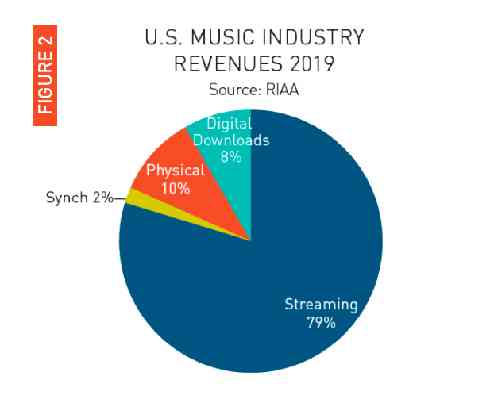Streaming persists as a major money maker for music’s fat-cats. Not only did it account for 80% of the entire music industry‘s profit in 2019, streaming collectively earned Universal, Sony, and Warner almost $1 million per hour — per fucking hour .

In fact, booming subscriber bases led to increased streaming revenues for the industry’s “Big Three.” Music Business Worldwide reports they hit $3.73 billion, $2.4 billion, and $2.21 billion respectively, down from 2018, but still impressive.


This solidifies services like Spotify as the primary revenue driver for Big Music; a market now larger than the entire US recorded music market just two years ago — accounting for 79.5% of all recorded music revenues.
[READ: Spotify is finally showing lyrics synced with music so you can sing along ]
Revenues from ad-supported streaming services like YouTube and Spotify‘s free version also grew annually by 20%. Some 500 billion songs were streamed to US listeners, generating $908 million, or 8% of the industry’s total music revenues.
No, really, it’s all about subscriptions
According to the RIAA , the number of paid subscriptions to on-demand streaming services rose 29% year-on-year, averaging 60.4 million throughout 2019, up from 46.91 million.
Paid subscriptions by far made the most revenue last year, bringing in $6.8 billion for the industry, up 25% on 2018, and almost two-thirds of all recorded music revenues in the US.
As subscriber counts go up, it makes sense that listeners download less music. The RIAA’s data showed sales for permanent album downloads sank 21% to $395 million, while individual track sales fell 15% to $415 million, again accounting for just 8% of all revenue in 2019.
This led digitally download music revenues to fall $18% last year to hit $856 million — under a billion dollars for the first time since 2016.
Digital and customized radio services like SiriusFM also took a hit, decreasing 4% year-over-year to $1.16 billion. People are buying vinyl though, a market 19% bigger than in 2018.
Even though vinyl brought in $504 million in 2019 (its fourteenth straight year of growth and the most since 1988) those sales made up just 4.5% of total revenues.
IPO all the major music labels!
Sony and Warner coincidentally made loads of cash with Spotify‘s IPO, each earning hundreds of millions of dollars in market sell-offs throughout 2018.
As time goes on and subscriber counts continue to swell, the parent orgs of the Big Three are looking to follow in Spotify‘s footsteps and go public .
Earlier this month, Universal owner Vivendi teased the possibility of an IPO by “early 2023 at the latest” after posting record earnings last year, just one week after Warner Music Group announced it would do exactly that .
Report: Japan is working on its own digital currency in retaliation to China’s
A group of lawmakers in Japan are reportedly working to create a state-issued digital currency.

According to Reuters , one of the lawmakers said its creation was a direct response to Facebook‘s Libra and China’s digital yuan.
“China is moving toward issuing digital yuan, so we’d like to propose measures to counter such attempts,” Norihio Nakayama, parliamentary vice minister for foreign affairs, told Reuters.
Indeed, Japanese lawmakers have spoken out against the digital yuan, saying that it would be a “very serious problem” if it becomes well-used for international settlements.
It seems details of a Japanese digital currency aren’t yet nailed down. However, it could be brought to life in a “joint initiative” between the Japan government and private companies.
The group devising the proposal is said to be handing over its plan next month.
Japan isn’t expected to release its own digital currency anytime soon. There are substantial regulatory hurdles that it will have to overcome.
Indeed, if Facebook‘s Libra is anything to go by , we can expect a centralized digital currency to have to undergo considerable scrutiny before it takes off.
Of course, if it’s government backed that will help allay some concerns Libra has faced . Libra is run by a select group of big tech companies which aren’t always known for being trusted .
We’re going to have to wait a lot longer to see how this one plays out, but it’s clear that central bank digital currencies are on their way , whether we need them or not .
CD Projekt Rekt: Cyberpunk 2077 tanks studio’s share price nearly 50%
Polish game studio CD Projekt‘s (CDR) stock continued to plummet on Monday following the bumpy release of its long-awaited video game Cyberpunk 2077.

At its worst, CDR stock hit a low of $65.19 on Monday, down more than 46% since the day before the first Cyberpunk 2077 reviews hit the internet.
The company’s share price recovered throughout the day and looks to finish around 8% lower than Friday’s close, and 33% below pre-Cyberpunk levels.
While the game holds a 90% rating on review aggregator Metacritic , gamers have detailed a high number of awkward glitches and bugs that’ve rendered Cyberpunk 2077 almost unplayable in many instances .
CDR promised a series of patches over the coming months, and says customers are free to request refunds if that doesn’t totally make up for the game’s poor performance.
Still, despite nearly halving in just six trading days, CDR stock is still up more than 4,300% since it first announced Cyberpunk 2077 in May 2012.
Considering the apparent stakes, let’s hope the studio pays its patch-makers overtime.











